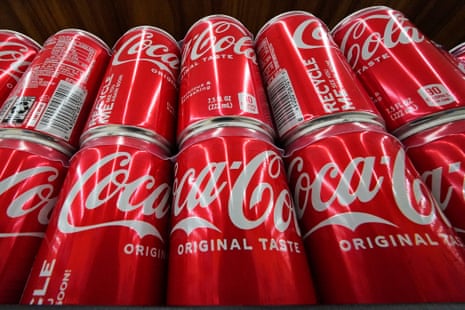Trump's Sugar Shockwave: Is Coke's Cane Sugar Switch the Health Revolution We Need?
:max_bytes(150000):strip_icc()/Health-GettyImages-1239099323-30991676ea1b48f8a3555d8a9b7b2bcf.jpg)
President Donald Trump announced that Coca-Cola has agreed to switch from high-fructose corn syrup to cane sugar in its regular Coke sold in the United States. This announcement, made on social media, was met with enthusiasm from Trump, who stated, “This will be a very good move by them — You’ll see. It’s just better!” However, theAssociated Pressnoted that Coca-Cola has yet to officially confirm this change, raising questions among consumers and health experts about the potential health implications.
Currently, American Coke is sweetened with high-fructose corn syrup (HFCS), a liquid sweetener derived from cornstarch. HFCS is a refined sugar, meaning it originates from natural sources but undergoes processing to remove other nutrients, leaving primarily pure sugar. Historically, Coca-Cola was made with cane sugar, but the company transitioned to the less expensive high-fructose corn syrup in the early 1980s. Interestingly, many other regions globally, as well as Mexican Coke sold in classic glass bottles in the U.S., continue to use cane sugar as their sweetener.

Photo Credit: Tribune Online
Despite the perception that cane sugar might be a healthier alternative, nutrition experts largely disagree. According to specialists like Lisa Moskovitz, RD, CDN, and Caroline Susie, RDN, LD, Coke sweetened with cane sugar offers no significant health advantages over its high-fructose corn syrup counterpart. Both cane sugar, derived from sugarcane or sugar beets, and HFCS are refined sugars with remarkably similar molecular structures, each containing roughly a 50/50 split of the simple sugars fructose and glucose. Consequently, the human body processes and digests both sweeteners in virtually the same manner.
Moskovitz emphasized that while cane sugar may seem 'natural' and thus healthier, this 'halo effect' is misleading. Susie further explained, “Our bodies aren’t going to know if that’s cane sugar or high-fructose corn syrup. We just know that it is sugar and we need to break that down.” Experts warn that excessive consumption of any refined sugar, regardless of its source, can contribute to significant health issues, including an increased risk of weight gain, type 2 diabetes, heart disease, and fatty liver disease. As Susie succinctly put it, “At the end of the day, it’s added sugar. Those added sugars really do add up.”

Photo Credit: The Guardian
Given these health considerations, nutritionists generally advise against regular soda consumption. Whether sweetened with cane sugar or high-fructose corn syrup, soda remains an 'empty-calorie, blood glucose-spiking beverage,' as Moskovitz described it. Even diet sodas, while calorie and sugar-free, are not recommended as they offer no nutritional value. For optimal hydration and health, experts advocate for water as the gold standard, along with alternatives such as unsweetened tea and sparkling water. For those craving a fizzy drink, Moskovitz suggests seltzer enhanced with a splash of juice or flavored with fresh fruits like berries, oranges, or limes.
You may also like...
Boxing World Mourns Joe Bugner: Legend Dies at 75

The boxing world mourns the passing of Joe Bugner at 75, a legendary British-Australian heavyweight champion known for f...
Super Falcons Seize 10th WAFCON Title, Oshoala Faces Retirement Rumours
)
The Super Falcons of Nigeria clinched their record-extending 10th Women's Africa Cup of Nations title with a dramatic 3-...
Hilarious Heartbreak: Benedict Cumberbatch & Olivia Colman's 'The Roses' Takes On Divorce

A cinematic triptych highlights recent film releases, from Jay Roach's dark comedy "The Roses" re-evaluating modern marr...
Pure Gold! Liam Neeson & Pamela Anderson's Chemistry Ignites 'Naked Gun' Remake

Recent film releases offer a diverse cinematic experience, featuring Liam Neeson's surprising comedic turn in 'The Naked...
Cardi B Unfiltered: Superstar Dishes on New Album, Family & 'Bad Karma' in Explosive Billboard Feature!

Seven years after her debut, Cardi B is ready to launch her highly anticipated second album, "Am I the Drama?" The artis...
African Music Crowns Its Best: AFRIMA 2025 Nominees Unleashed!

The All Africa Music Awards (AFRIMA) 2025 has unveiled a record-breaking list of 343 nominees across 40 categories, foll...
Chrisley Family's Tumultuous Return: Post-Prison Confessions & New Reality Show Drama Unfold

The Chrisley family returns to television with their new Lifetime series, "The Chrisleys: Back to Reality," premiering S...
Bianca Censori's Daring Public Looks Spark Frenzy After Kanye West Revelation

My baby she ran away / But first she tried to get me committed / Not going to the hospital ’cause I am not sick I just d...